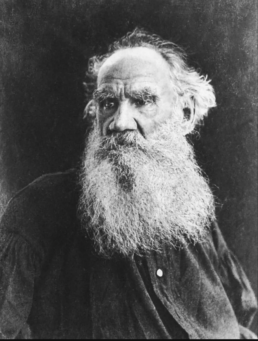These life stories may contain descriptions of childhood trauma and abuse, as well as images, voices and names of people now deceased. If you need help, you can find contact details for some relevant support services on our support page.
Renowned Russian writer, Leo Tolstoy (1828-1910), was in kinship care as a child.
Lev Nikolayevich Tolstoy was born into an aristocratic family on the sprawling family estate, Yasnaya Polyana, about 200 km south of Moscow. Leo’s mother died when he was a toddler and his father died when the boy was nine years old. Other guardians—his grandmother in 1838 and an aunt in 1841—also died before Leo was grown. Leo and his siblings then went to live with another aunt in western Russia.
Primary and secondary education happened at home with tutors. Tolstoy enrolled in the University of Kazan as a sixteen-year-old in 1844. Spending more time partying than studying, he left the university without a degree and returned to Yasnaya Polyana.
He later joined the army and fought in the Crimean War which began in 1853 and went for more than two years. From 1847 Tolstoy was keeping a diary and used much of the material in his later fiction. He published several pieces anonymously in 1855 and 1856.
Having an interest in teaching children led Tolstoy to establish a school on his estate for peasant children after he resigned from the army. He published the journal Yasnay Polyana for twelve months from 1862.
After his marriage to Sofya Andreyevna Bers (1844-1919) – with whom he had thirteen children – Tolstoy settled down and concentrated on writing the two works he is most famous for, War and Peace (1869) and Anna Karenina (1877), plus many other novels and short stories.
In 1910, Leo Tolstoy died of pneumonia at a small rural railway station at the age of eighty-two. He had apparently left his family home several days earlier, seeking “solitude and quiet” but his poor health brought a flurry of media activity to Astapova. By then he had the status of a “visionary, reformer, moralist, and philosophical guru” (Beard) owing to his critiques of the Russian government, the Russian Orthodox church, meat-eating, war-mongering, and private property.
And he was a vigorous supporter of the Russian poor. He had launched welfare programs…and funded schools…he renounced his aristocratic title…and took to wearing the characteristic dress of the peasants… (Beard).
The last two weeks of Tolstoy’s life were remembered in the 2009 biopic, The Last Station, starring Helen Mirren and Christopher Plumber.
References:
Beard, Mary. “Facing Death with Tolstoy.” The New Yorker, 5 November 2013. https://www.newyorker.com/books/page-turner/facing-death-with-tolstoy
Harding, Luke. “Leo Tolstoy: the forgotten genius?” The Guardian, 6 January 2010. https://www.theguardian.com/books/2010/jan/06/leo-tolstoy-the-last-station
Morson, Gary Saul. “Leo Tolstoy. Russian Writer.” Britannica, 2018. https://www.theguardian.com/books/2010/jan/06/leo-tolstoy-the-last-station
Image available here.
